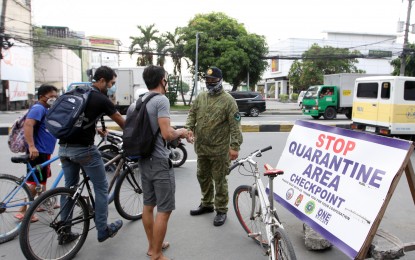
(File photo)
MANILA – Filipinos’ lifestyle has completely changed when coronavirus disease 2019 (Covid-19) struck the country.
Far different from having the liberty of strolling around and enjoying the sights in different parts of the country, most of them have been forced to stay home at all times during the first few months since President Rodrigo Duterte imposed the most restrictive community quarantine in the country in March last year.
The coronavirus pandemic may have restricted Filipinos’ movement when it hit the country last year, but they did not let it steal their innate qualities of being happy and optimistic.
Jazelle Ortega, a Cavite resident, looked at the brighter side, saying the one-year lockdown has allowed her to spend more time with her family, take care of herself, and have enough rest, things she was deprived of before the implementation of strict quarantine rules.
“Para po sa akin, marami din namang nagawang maganda ang quarantine protocols lalo na sa kabila ng pandemyang patuloy nating kinakaharap (For me, quarantine protocols have brought many advantages despite the pandemic that we continue to face),” Ortega told the Philippine News Agency (PNA).
She said the lockdown does not only keep her safe from Covid-19 but also enables her to save more money since she could not go out of her residence.
“Para sa mga breadwinner na katulad ko, ang WFH (work-from-home) setup ay malaki ang naitulong para makabawas sa gastos pamasahe at allowance sa pagkain. Dahil din dito ay nagkaroon ako ng tamang pahinga, tulog sa bawat araw. Nagkaroon pa ng extra time para makapag-ehersisyo (For a breadwinner like me, the work-from-home setup helped me a lot to spend less on commuting and food. Because of this, I have more time to take a rest and have enough sleep every day. I also have extra time to exercise),” she said.
Like Ortega, Pauleen Anne Sumagui found joy amid the lockdown because she is able to have more quality time with her family.
“Nagkasama-sama kami ng pamilya ko at nakapag-bonding kahit nasa bahay lang, kaysa dati na busy ang mga tao at halos hindi na nag-uusap (My family has been together and we are able to bond at home, unlike before when people were busy and had no time to talk to each other),” said Sumagui, a Grade 5 student at the Barasoain Memorial Integrated School in City of Malolos, Bulacan.
A female Chinese national from Wuhan, the then epicenter of the coronavirus, was the Philippines’ first Covid-19 patient. She displayed no symptoms when she arrived in the Philippines on January 21 last year.
The detection of the first Covid-19 case in the country prompted Duterte to order a temporary travel ban on visitors from Wuhan City and the entire Hubei province in China on Jan. 31, 2020.
On March 8, 2020, Duterte was forced to place the entire Philippines under a state of public health emergency after the health department reported the first local transmission of Covid-19.
Four days after, or on March 12 last year, Duterte announced the imposition of a Metro Manila-wide enhanced community quarantine (ECQ), the most stringent community quarantine, to control the spread of Covid-19.
The President then decided on March 16, 2020 to implement ECQ in the entire island of Luzon.
The ECQ implementation required Filipinos to observe strict home quarantine, suspended public transportation, regulated food and essential services, and heightened police presence for the enforcement of quarantine protocols.
Faster gov’t transactions
Ortega, who is currently in Denmark after participating in a cultural exchange program, said government transactions have become faster and more convenient during the lockdown period.
She recalled that it only took a short time to process all the requirements needed for her outbound travel amid the pandemic.
“Kakaunti ang mga tao sa tanggapan ng gobyerno or mga opisina kasi by appointment ang pagpunta at safe na rin, kasi hindi maraming tao ang makakasalamuha (There were only a few people inside government offices because you have to go there by appointment. It was also safe because there were only a few people there),” Ortega said.
On October 21 last year, the Inter-Agency Task Force for the Management of Emerging Infectious Diseases lifted the ban on non-essential outbound travel of Filipinos.
Health protocols followed
Sangguniang Kabataan chairman Aerol John Cardenas of San Jose village in Bulakan, Bulacan said the Covid-19 pandemic taught him to give importance to time management, his family, and the government’s health protocols.
“(Natutunan ko) kung paano pahalagahaan ang oras, pati na ang pamilya, at ‘yung kung paano natin natutunan paano sumunod sa binababang protocols ng LGUs (local government units), PNP (Philippine National Police) saka gobyerno (I learned how to value time and my family, and how to follow protocols imposed by LGUs, the PNP, and the government),” Cardenas said.
In May last year, Duterte decided to ease movement restrictions to reopen the Philippine economy, imposing for the first time the less restricted general community quarantine (GCQ) in some parts of the country.
Despite the relaxation of quarantine rules, Gemma Mabanta, a village worker in Bulakan, Bulacan, said she continues to follow the government’s public health protocols, such as the use of face masks and face shields, strict social distancing, and frequent hand washing to protect herself and her family against Covid-19.
“Napahalagahan ko ang aking sarili. Na-realize ko ang mga higit na mahalagang bagay at tao sa buhay ko. Natuto rin ako kung paano sumunod sa health protocols (I have learned to value myself. I have realized that my loved ones are important to me. I have also learned to follow protocols),” Mabanta said.
Currently, GCQ and the most relaxed modified GCQ (MGCQ) are the only quarantine classifications imposed in the country.
Metro Manila, Apayao, Baguio City, Kalinga, Mountain Province, Batangas, Tacloban City, Iligan City, Davao, and Lanao del Sur are under GCQ until March 31, while the rest of the country stays under MGCQ. (PNA)
